Text
"So, here's the case! See what you all think!

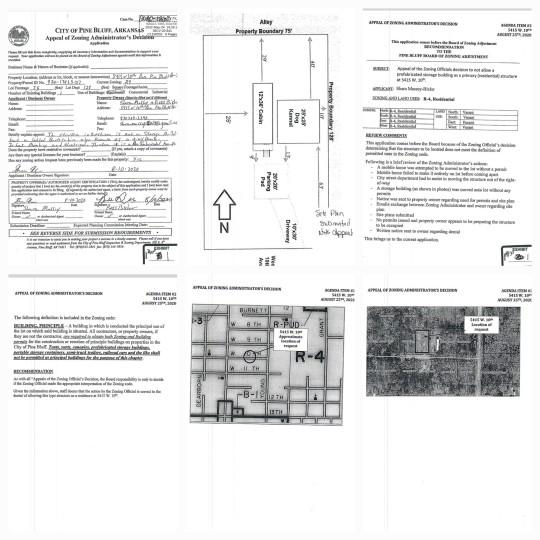
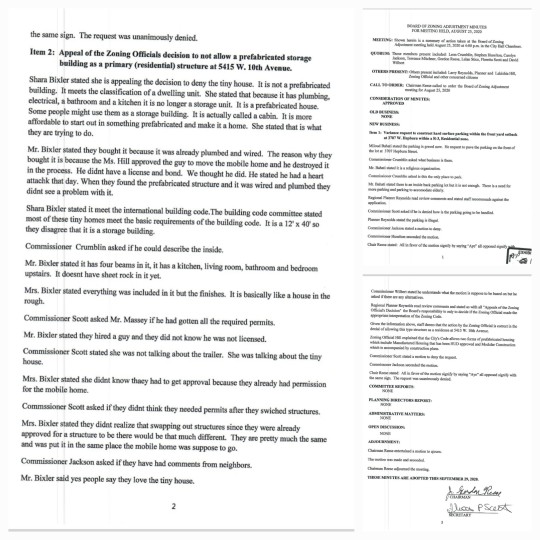
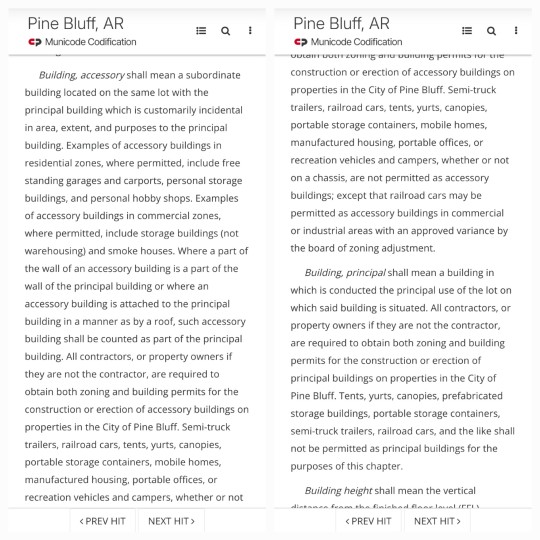






Firstly, mind you, we did submit a site plan to get a permit to originally move the mobile home. I was emailed and, to my knowledge, was given approval. No paperwork stating that fact was given or offered; however, after the fact, that is denied to be the case.
Secondly, they all lied here and lied in court under oath. I have documented proof of that fact on at least one of them.
Thirdly, the pictures that look like just trees actually show my neighbors!
Fourth, I am hearing impaired and had no idea what was being said in that initial meeting. I only learned about this whitewash after reading these documents submitted to the court!
Fifth, I never knew anything about their so-called task force; every person that lied on May 5th is probably on it!
Finally, we were given 30 days to move the building, or it will be condemned and abated. I owe six payments, nearly $30,000 invested here in total! I lived in a tent for eight days in 2020 before we put this building in. I guess I'll be back in one soon! Is this Pine Bluff, Arkansas at its finest? Five years, folks, five years!
Update: For further elaboration on the whole story, I'm going to post at the end the pictures of our mobile home that was destroyed when being moved. This will show what we were going through at the time five years ago and the reason the building became the only option to keep from being completely homeless. I also added the original site plan and the few emails I could find."
1 note
·
View note
Text
The Divine Unfolding: A Symbolic Journey Through Ezekiel: Spirals, Wheels, and the Interconnectedness of the Cosmos
The ancient revelation wisdom that "a spiral is a 'wheel within a wheel'" offers a profound lens through which to explore the intricate relationship between God, creation, and humanity. This concept, resonating deeply with biblical imagery, particularly Ezekiel's vision, and universal mythological symbolism, unveils a dynamic and interconnected cosmic order. By envisioning a triune sphere with God at its center, we can trace the emanation of divine power and purpose through all realms of existence.
I. The Spiral: A Universal Symbol of the "Wheel Within a Wheel"
The core assertion of this message that a spiral is a "wheel within a wheel" provides a potent starting point for exploring profound spiritual and cosmic themes. This phrase immediately evokes the visionary passages in Ezekiel, where the divine chariot is described with its intricate and awe-inspiring wheels.
A. Biblical Resonance: Ezekiel's Chariot and the Divine Spiral
Ezekiel's "wheel within a wheel" (Ezekiel 1:16-21 and 10:9-19) isn't explicitly called a spiral, but its description functions like one in its symbolic implications.
1. Intricate Providence and Interconnectedness
The nested nature of the wheels, allowing movement in any direction without turning, mirrors the inherent complexity and seamless interconnectedness of a spiral. Just as a spiral unfolds from a central point and expands outwardly while remaining unified, God's providence operates with a profound, often mysterious, design. Every event, every twist and turn, is part of a larger, interconnected divine plan.
2. Mobility and Omnipresence
The ability of Ezekiel's wheels to move in any direction without turning speaks to divine omnipresence. A spiral, with its continuous, non-linear path, similarly conveys this sense of pervasive presence. It suggests a divine activity not confined to straight lines or predictable trajectories but permeating all space and time.
3. Eyes and Omniscience
The "eyes" on the rims of the wheels in Ezekiel symbolize God's all-seeing nature. Overlaid with the image of a spiral, this detail takes on new depth. Imagine the spiral as a continuous path of divine observation, each "eye" representing a point of awareness along the unfolding design of creation.
4. Elevated Position and Omnipotence
The exalted position of the wheels signifies God's supreme power. The spiral, as a symbol of cosmic order and boundless energy, reinforces this. Its ever-expanding nature can represent the outward manifestation of divine power, while its centralized origin points to the single, ultimate source of all might.
5. Constant Movement of the Spirit
The ceaseless motion of the wheels aligns perfectly with the dynamic nature of a spiral. This suggests the continuous, unfolding work of God's Spirit in the world. Grace and power aren't static but flow and evolve, constantly shaping creation, guiding individuals, and moving history forward in a spiraling progression of divine purpose.
B. Universal Mythological and Symbolic Connections of the Spiral
The spiral, when understood as a "wheel within a wheel," brings a wealth of universal mythological and symbolic meanings to the biblical image.
1. Cycles of Life and Cosmic Recurrence
The "wheel within a wheel" effectively captures the cyclical nature represented by the spiral—birth, death, rebirth; seasons; tides. This implies that God's providence, while linear in its ultimate goal (salvation history), also operates within recurring patterns.
2. The Sun, Creation, and Cosmic Dance
The spiral's association with the sun and celestial movement imbues the "wheel within a wheel" with cosmic significance. It suggests that the divine apparatus described by Ezekiel is intimately connected to the very fabric of the cosmos, mirroring the swirling energies of creation.
3. Water, Origin, and Flow
The spiral's connection to water—ripples, whirlpools—can be applied to Ezekiel's vision. The "wheel within a wheel" might symbolize the source of divine life and energy, constantly flowing and shaping reality, much like water shapes the land.
4. Journey, Transformation, and the Path to the Divine
The inward/outward motion of the spiral perfectly encapsulates the journey of transformation. The "wheel within a wheel" becomes a metaphor for spiritual pilgrimage—a winding path that leads deeper into understanding God or outward into mission and service.
5. Mother Goddess, Fertility, and Renewal (with caution)
While not directly biblical, the ancient association of spirals with fertility and renewal adds a layer of depth to the "wheel within a wheel." It subtly suggests that God's providence is inherently life-giving, constantly bringing forth new life and fostering renewal.
6. Time, Eternity, and the Unfolding of History
The continuous, never-ending nature of the "wheel within a wheel" as a spiral powerfully represents the flow of time and eternity. It suggests that God's plan unfolds in time but is simultaneously contained within an eternal, unchanging reality.
7. Spiritual Realms and Transcendence
The idea of the spiral as a pathway to other realms resonates with Ezekiel's vision as a glimpse into the divine realm. The "wheel within a wheel" becomes a symbolic gateway, allowing the prophet to perceive higher spiritual realities and the mechanics of God's heavenly operations.
8. Growth and Expansion
The outward unfurling of the spiral, symbolized by the expanding "wheel within a wheel," embodies growth and the unfolding of potential. This speaks to God's continuous work of creation, His ongoing revelation, and the progressive development of humanity and the cosmos.
II. The Triune Sphere: God, Creation, and Humanity as Interconnected Circles
The concept of "three circles interconnected, each inside the other, with God as the center source emanating out and through each sphere" provides a powerful visual metaphor for understanding the relationship between God, creation, and humanity. Imagine three concentric circles, or rather, three spheres, each existing within and influencing the others.
A. The Innermost Sphere: God (The Center Source)
1. Representation
This is the absolute core, the uncreated, uncontained, and all-encompassing reality of God. It is the very essence of being, the source of all existence.
2. Emanation
From this center, divine energy, love, wisdom, and power radiate outwards. This is the Logos (Word) by which all things are made, the Spirit that breathes life into creation. The other spheres exist because of and within God's emanating presence.
3. "Wheel Within a Wheel" Connection
This innermost sphere is the ultimate "wheel within a wheel." It represents the divine mind and will, the infinitely complex and interconnected origin point from which all reality unfolds. It is the perfect, self-contained spiral of divine being, constantly in motion within itself and radiating outward.
B. The Middle Sphere: Creation/Cosmos
1. Representation
This sphere is the entirety of the created universe—the heavens, the earth, all living things, laws of physics, time, and space. It is the first manifestation of God's outward emanation.
2. Interconnectedness
This sphere exists within God's emanating presence and is entirely dependent on it. It is sustained by the divine energy flowing from the center.
3. "Wheel Within a Wheel" Connection
The cosmos itself operates like a vast "wheel within a wheel."
a. Cycles of Nature
The spiraling cycles of seasons, planetary orbits, galactic arms, and evolutionary processes are all manifestations of the divine blueprint. Each cycle is a "wheel" moving within the larger "wheel" of cosmic existence, reflecting God's constant activity and order.
b. Ezekiel's Vision
The "wheels" in Ezekiel's vision can be seen as the very mechanics of this cosmic sphere, divinely animated and directed. Their intricate, omnidirectional movement speaks to the flexibility and omnipresence of God's interaction with creation. The "eyes" on the wheels symbolize God's omniscience pervading every part of the created order.
C. The Outermost Sphere: Humanity/Sentient Life
1. Representation
This sphere encompasses humanity and all sentient life, specifically highlighting our unique capacity for consciousness, relationship with God, and moral choice. We are part of the created order, but distinct in our ability to reflect the divine image.
2. Interconnectedness
This sphere exists within the created cosmos and is also permeated by God's emanating presence. Our existence is contingent on both the divine source and the functioning of the created world. We are beneficiaries of, and participants in, the ongoing cosmic dance.
3. "Wheel Within a Wheel" Connection
Humanity's journey is also a "wheel within a wheel," a spiraling path:
a. Spiritual Growth
Spiritual growth is a constant, upward spiral. Each turn represents a deepening understanding, new challenges, and a closer walk with God. This human "wheel" moves within the larger "wheel" of divine providence and cosmic cycles.
b. Personal and Collective History
Human history itself can be viewed as a complex, often cyclical, spiral of progress and regression, learning and forgetting. Yet, within this, there's a linear progression towards a divine telos (purpose), guided by God's overarching plan (the ultimate "wheel").
c. The Imago Dei
The "wheel within a wheel" also speaks to the internal complexity of humanity—our spirit, soul, and body, or our mind, will, and emotions—all interconnected and designed to function in harmony, reflecting the unity and complexity of God.
III. Integration of Concepts: Flow and Purpose
When these ideas are combined, the symbology becomes incredibly rich, portraying a universe not just created by God, but continuously participating in and sustained by His dynamic, ever-present, and intimately involved essence.
A. God as the Dynamic Center
The "wheel within a wheel" at the core of God emphasizes not a static entity, but a dynamic, self-existent, and eternally active being. From this dynamic core, all life and order emanate.
B. Creation as Ordered Manifestation
The middle sphere, the cosmos, isn't chaotic but divinely ordered. The spiraling patterns and cycles within creation are evidence of God's constant presence and maintenance, much like the intricate gears of a cosmic "wheel within a wheel."
C. Humanity as Interacting Participants
We, in the outermost sphere, aren't merely observers but active participants. Our spiritual journeys are individual spirals, our histories collective spirals, all moving within and interacting with the larger cosmic and divine spirals. We are meant to align our "wheel" with God's ultimate "wheel."
D. Omnipresence and Omniscience as Pervasive
The "eyes" on the wheels pervade all three spheres, signifying God's omniscience extending into every detail of creation and every thought of humanity. The omnipresence of God means His emanation isn't a one-time event but a continuous, sustaining flow through every sphere.
E. Providence as an Unfolding Spiral
God's providence isn't a rigid linear path but an unfolding, adapting spiral. Events in the outermost human sphere, influenced by choices and circumstances, are continually re-integrated into the larger cosmic and divine plan, always spiraling towards God's ultimate good.
Conclusion
The assertion that "a spiral is a 'wheel within a wheel'" serves as a profound symbolic statement, brilliantly bridging the specific biblical imagery of Ezekiel with the universal and timeless symbolism of the spiral. This unified perspective transforms abstract divine descriptions into a tangible, dynamic representation of God's intricate and all-encompassing providence, the continuous unfolding of divine action in creation, and a journey of spiritual growth leading deeper into the divine.
By viewing Ezekiel's wheels through the lens of a spiral and integrating this with the concept of three interconnected spheres, we gain a richer appreciation for the dynamism, mystery, and interconnectedness inherent in the divine's interaction with the created order. This paints a picture of a universe not just created by God, but continuously participating in and sustained by His dynamic, ever-present, and intimately involved essence. It is a vision of profound order, interconnectedness, and ceaseless divine activity, revealing a God whose work isn't static or linear, but an ever-present, ever-moving force, perpetually unfolding and enveloping all of existence within its intricate, divine design.
Blessings,
Love & Light!
Shara Massey
5/20/2025

#bible scripture#bible study#christian blog#christian faith#christian living#holy spirit#jesus christ#ministry#spiritual growth#spiritual journey#holy bible#faith in jesus#faith in god#faith#spirituality#symbols#signs#prophecy#prophet
1 note
·
View note
Text
The Significance of 212: A Journey through Scripture and Myth
Let's begin by considering the distance between Ikaria and Patmos, approximately 212 km. While the number 212 doesn't feature prominently in direct biblical references, its potential significance warrants exploration.
In 1 Chronicles 9:22, we find a notable instance: "those chosen as gatekeepers at the thresholds numbered 212." This highlights a specific group dedicated to service and order within the temple. The context emphasizes the importance of their roles and their genealogical registration, suggesting a structured and significant function in the worship of God. This establishes a connection between the number 212 and the concept of designated roles within a sacred space.
Beyond its specific biblical occurrence, the number 212 also appears in the realm of "angel numbers," where it's often interpreted as a message of balance, new beginnings, and personal growth. It encourages maintaining harmony in relationships while also embracing independence. Furthermore, it can signify the importance of trusting the divine plan and listening to one's intuition while navigating a spiritual journey. The number 212, in this context, may urge individuals to deepen their connection with the divine through practices like meditation or prayer.
The number 212 can also be deconstructed into its constituent parts, the numbers 2 and 1. The number 2 often represents partnership, balance, and witness, while 1 can symbolize unity, new beginnings, and God's sovereignty. The repetition of 2 in 212 may amplify these qualities, suggesting a dynamic interplay between balance and unity.
Patmos, Ikaria, and the Enduring Message of Hubris
Now, let's turn our attention to the interconnected narratives of Patmos and Ikaria, and the message of hubris they convey.
Patmos is the island where John received the Revelation of the last days. While the true meaning and origin of the name "Patmos" remain a mystery, a Greek legend recounts that the island was originally named "Letois" after Artemis's mother, Leto. Although the name changed to Patmos, this connection hints at a possible, though indirect, origin. Intriguingly, Artemis was the twin sister of Apollo.
In later interpretations and artistic depictions, the symbolism of the sun is frequently associated with Apollo, the god of light. This brings us to Ikaria, named after Icarus, the mortal figure from Greek myth whose ambition and hubris led to his demise. He flew too close to the sun; his wings melted, and he fell into the sea near the island, which was then named Ikaria in his memory.
In my belief, this is a sign which carries a significant message, a warning, and a call to vigilance. The message is clear: "You all are flying too high!" Just as flying too close to the sun—a celestial body often linked to Apollo (Sun, Light, and symbolically, the Son)—was central to Icarus's downfall, it serves as a powerful metaphor for the dangers of overreaching ambition and pride. This ancient cautionary tale, combined with the symbolic number 212 and its association with designated roles, also functions as a call to God's gatekeepers and watchmen to be vigilant in prayer, discerning the times and guarding against spiritual arrogance.
Blessings,
Love & Light!
5/20/2025
Shara Massey
There was a report of a "dazzling bright light apparition" over the island of Ikaria in Greece a few days ago.

#bible scripture#bible study#christian blog#christian faith#christian living#holy spirit#jesus christ#ministry#spiritual growth#spiritual journey#prophecy#prophet#holy bible#bible verse#bible#faith in jesus#jesus#greek mythology#reddit#news#explore#personal#thoughts#philosophy#symbols#symbolic#trending
1 note
·
View note
Text
A Watchman of the Fourth Watch: Rear Guard of the Lord's Army
I. Isaiah 62:6
The verse Isaiah 62:6 states: "I have set watchmen upon thy walls, O Jerusalem, which shall never hold their peace day nor night: ye that make mention of the LORD, keep not silence," (KJV).
II. Meaning of Isaiah 62:6
This verse speaks metaphorically about God appointing "watchmen" over Jerusalem. These watchmen are not literal guards on city walls but represent people with a spiritual responsibility to be vigilant, just as watchmen looked out for danger, these individuals are to be spiritually alert to the needs and the spiritual state of Jerusalem (representing God's people); to be persistent in prayer and intercession, as the phrase "shall never hold their peace day nor night" emphasizes the continuous nature of their duty, they are to be unceasing in their prayers and in calling upon the Lord; to remind God of His promises, the address "ye that make mention of the LORD" can be interpreted as those who bring God's promises to remembrance, both to themselves and to God in prayer, urging their fulfillment; and to not remain silent, they are to speak out, to prophesy, to teach, and to be a voice for God's purposes for Jerusalem. Essentially, this verse is a call for persistent, around-the-clock prayer and spiritual vigilance for the sake of God's people and the fulfillment of His plans for them.
III. Relation to the Fourth Watch
The "fourth watch" refers to a specific time division of the night, particularly in the Roman system, which was likely known during the New Testament period. The night was divided into four watches: First Watch (approximately 6 PM to 9 PM), Second Watch (approximately 9 PM to 12 AM (midnight)), Third Watch (approximately 12 AM to 3 AM), and Fourth Watch (approximately 3 AM to 6 AM (until dawn)).
While Isaiah 62:6 doesn't explicitly mention the "fourth watch," the concept of watchmen who "shall never hold their peace day nor night" inherently includes this time period. The idea of continuous vigilance means that prayer and spiritual alertness should occur during all watches, including the fourth watch.
In some Christian traditions, the fourth watch (3 AM to 6 AM) is considered a particularly significant time for prayer, partly based on biblical accounts, such as Jesus walking on water to his disciples during the fourth watch (Matthew 14:25), and the belief that this is a time when spiritual battles may be intense or when God's intervention is often seen before the "dawn" of a new day or situation. Those who feel called to be spiritual "watchmen" might see praying during the fourth watch as a way to actively fulfill the call of Isaiah 62:6, maintaining vigilance and intercession even in the darkest hours.
In summary, Isaiah 62:6 calls for continuous, unwavering prayer and spiritual alertness by those appointed as "watchmen" for God's people. The "fourth watch," being a significant part of the night, falls under this continuous watch. For some, praying during this time is a specific way to embody the role of the watchman described in Isaiah, seeking God's intervention and the fulfillment of His promises even before the "dawn."
IV. Rear Guard Analogy
The concept of the "rear guard" can be related to Isaiah 62:6 and the idea of the "fourth watch" through the lens of protection, vigilance, and strategic timing in spiritual warfare and support.
In a military context, the rear guard is a detachment of troops that protects the main body from attack from the rear during a withdrawal or movement. Their role is crucial for ensuring the safety and integrity of the entire group, and they must be vigilant, watchful for any pursuing enemy, and ready to defend.
Similarly, the watchmen on the walls of Jerusalem are tasked with vigilance, constantly alert to potential threats, not necessarily physical enemies in this context, but spiritual dangers, the well-being of the city (God's people), and the need for God's intervention, with their unceasing prayer acting as a spiritual defense. The rear guard often operates during vulnerable times, such as during a retreat when the main body might be more exposed, and the late hours of the night, including the fourth watch, can be seen as analogous to such vulnerable periods in a spiritual sense – times when weariness might set in, when darkness seems most prevalent, or when the enemy might seek to exploit weaknesses.
As mentioned earlier, the fourth watch is sometimes considered a strategic time for prayer and spiritual warfare, and just as a rear guard is crucial during a potentially dangerous phase of movement, focused prayer during the "darkest" hours can be seen as a way to guard against spiritual attacks and ensure breakthrough before the "dawn" of a new day or situation. The actions of the rear guard, by holding off threats, allow the main body to either advance securely or retreat in an orderly fashion, playing a vital supportive role.
Likewise, the watchmen in Isaiah 62:6, through their persistent prayer and reminding God of His promises, are also acting in a supportive role for Jerusalem, interceding for its well-being and the fulfillment of God's purposes, with their prayers seen as clearing the way for spiritual progress and protection.
V. Bringing it Together
You can think of those who are particularly called to prayer and spiritual vigilance, especially during challenging or "dark" times (analogous to the fourth watch), as functioning like a spiritual "rear guard." They stand watch when others might be weary or less alert, interceding and resisting spiritual opposition to protect the advancement of God's kingdom and the well-being of His people. Their persistent, "day and night" commitment, as described in Isaiah 62:6, ensures that there is always a spiritual defense in place, much like a rear guard safeguards a moving army.
Therefore, while Isaiah 62:6 doesn't directly mention a "rear guard," the underlying principles of vigilance, protection, and unwavering commitment resonate with the responsibilities of a rear guard. When coupled with the idea of the strategic timing of the fourth watch, it highlights the importance of persistent prayer and spiritual alertness, especially during times that might feel vulnerable or critical for breakthrough.
Blessing's
Love & Light!
Shara Massey
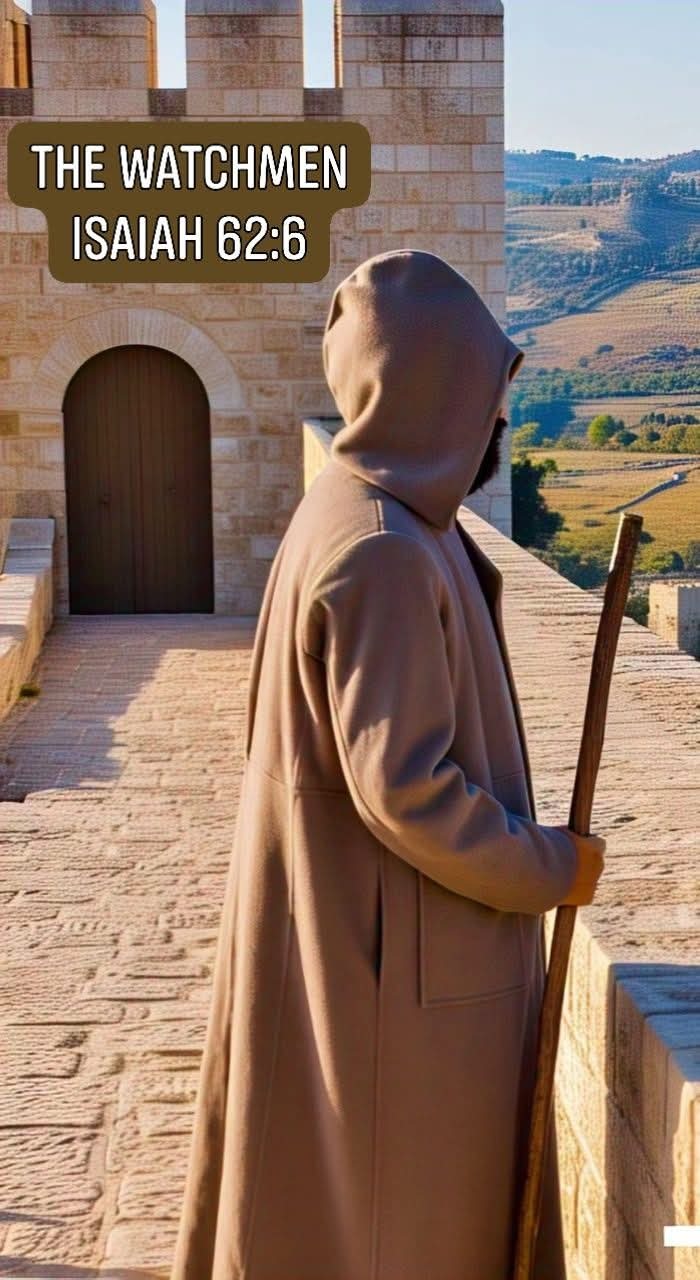
#christian blog#christian faith#christian living#christianity#faith in jesus#jesus#jesus christ#bible scripture#bible study#bible verse#spiritual journey#spiritual growth#spirituality#holy spirit#holy bible#faith in god#faith
2 notes
·
View notes
Text
Hallalujah!

#jesus christ#faith in jesus#jesus#christian faith#christian blog#christianity#holy bible#holy spirit
5 notes
·
View notes
Text
The Extravagance of Love: Echoes of Bethany
I. Introduction
This study delves deeper into the anointing at Bethany (Matthew 26:6-13; Mark 14:3-9; John 12:1-8), exploring its themes of extravagant love, prophetic action, and the tension between practical concerns and spiritual understanding. We will also examine other biblical instances where these themes resonate, demonstrating the enduring importance of this message.
II. Scripture Passage: Matthew 26:6-13 (NIV)
"While Jesus was in Bethany in the home of Simon the Leper, a woman came to him with an alabaster jar of very expensive perfume, which she poured on his head as he was reclining at the table. When the disciples saw this, they were indignant. “Why this waste?” they asked. “This perfume could have been sold at a high price and the money given to the poor.” Aware of this, Jesus said to them, “Why are you bothering this woman? She has done a beautiful thing to me. For you will always have the poor among you, but you will not always have me. When she poured this perfume on my body, she did it to prepare me for burial. Truly I tell you, wherever this gospel is preached throughout the world, what she has done will also be told in memory of her.”
III. Context
This event occurs shortly before Jesus' crucifixion. He is in Bethany, a short distance from Jerusalem, at the home of Simon the Leper. This detail is important, as it highlights Jesus' willingness to associate with those considered outcasts by society. The shadow of the cross is looming, and Jesus is preparing his disciples for his departure.
IV. Key Characters and Their Significance
* Jesus: He is the central figure, receiving this act of extravagant love and devotion. His acceptance of the anointing reveals his understanding of its symbolic significance, foreshadowing his death and burial.
* The Woman (Mary of Bethany - John 12:3): While Matthew's Gospel doesn't name her, John identifies her as Mary, the sister of Lazarus and Martha. Her act is one of profound love, humility, and prophetic understanding. The expensive perfume suggests a great personal sacrifice. This anointing wasn't just a social custom; it carried a deeper spiritual meaning, preparing Jesus for his ultimate sacrifice.
* The Disciples: Their reaction highlights the tension between practical concerns (caring for the poor) and spiritual understanding. Their indignation reveals a lack of comprehension regarding Jesus' impending death and the significance of the woman's actions.
V. Expanding on the Bethany Narrative
* The Cost of Love: The perfume's value is emphasized. It wasn't just any perfume; it was "very expensive" (πολυτίμου μύρου - polytimou myrou). This highlights the woman's sacrifice. She gave her best, a tangible representation of her love and devotion. This challenges us: what are we willing to sacrifice for our love for Christ? Is our worship marked by genuine cost and sacrifice, or is it merely convenient?
* Prophetic Significance: The woman's action, though seemingly spontaneous, carries prophetic weight. Jesus interprets it as preparation for his burial. This underscores the spiritual insight she possessed, perhaps unknowingly. Her act wasn't just an emotional outburst; it was a profound recognition of Jesus' impending fate.
* Misplaced Priorities: The disciples' indignation reveals a common human tendency: prioritizing the practical over the spiritual. While caring for the poor is essential, they missed the unique opportunity to honor Jesus in this moment. This isn't a dismissal of social justice; it's a call to recognize the sacred in the midst of the everyday. Are we so busy with the "doing" of ministry that we miss the "being" with Jesus?
VI. Echoes Throughout Scripture
The themes present in the Bethany anointing resonate in other biblical narratives:
* Mary's Magnificat (Luke 1:46-55): Mary's song echoes the extravagance of God's love in choosing her, a humble woman, to be the mother of the Messiah. Her "yes" to God involved immense personal sacrifice and social risk. Like the woman at Bethany, Mary's act of faith was a beautiful and costly expression of love.
* David's Dance Before the Ark (2 Samuel 6): David's exuberant dancing before the Ark of the Covenant was considered undignified by some, including his wife Michal. Yet, David's unrestrained joy was an expression of his love and reverence for God. It demonstrates that worship sometimes transcends conventional decorum and involves an outpouring of the heart.
* The Widow's Offering (Mark 12:41-44): Jesus contrasts the rich people's large donations with the widow's small offering. While the amounts differed, the widow's gift, though meager, represented a greater sacrifice proportionally. Her "extravagant" giving from her poverty mirrored the woman's "extravagant" use of expensive perfume. Both stories emphasize that true giving comes from the heart and involves sacrifice.
* Hosea's Unfailing Love (Book of Hosea): Hosea's unwavering love for his unfaithful wife Gomer serves as a metaphor for God's steadfast love for his people. Despite Israel's repeated betrayals, God's love remains constant and extravagant. This echoes the theme of extravagant love in the Bethany narrative, demonstrating the boundless nature of divine love.
* Jesus Washing the Disciples' Feet (John 13): Jesus, despite being their Lord and teacher, humbly washes his disciples' feet, an act of extreme service. This "extravagant" display of humility and love foreshadows his ultimate act of self-sacrifice on the cross.
VII. Ministry Implications:
* Cultivating a Heart of Extravagant Love: We must cultivate a heart that is willing to love God and others extravagantly, beyond the boundaries of practicality and social expectations. This involves surrendering our resources, time, and even our reputations for the sake of Christ.
* Discerning the Sacred: We need to develop the spiritual discernment to recognize the sacred moments in our lives and ministries. Are we so focused on the mechanics of ministry that we miss the opportunities for genuine encounters with God?
* Balancing Practicality and Spirituality: The tension between practical concerns and spiritual understanding is a constant challenge. We must strive to balance our commitment to social justice and practical ministry with a deep awareness of God's presence and a willingness to express our love for him in ways that may seem "extravagant" to others.
* Remembering the "Anointing" Moments: Just as the woman's act is remembered, we should strive to create "anointing" moments in our ministries – moments of profound love, devotion, and sacrifice that leave a lasting impact on others.
VIII. Discussion Questions
* How do we determine what constitutes "extravagant" love in our context? What are some examples of extravagant love that you have witnessed?
* How can we avoid the trap of prioritizing the practical over the spiritual in our ministries?
* How can we create environments in our churches and ministries where "anointing" moments can occur?
* How does the story of the anointing at Bethany challenge our understanding of worship?
* Reflect on a time when you felt you gave extravagantly of yourself. What was the outcome?
IX. Further Study:
* Read parallel accounts in Mark 14:3-9 and John 12:1-8.
* Explore commentaries on Matthew 26:6-13 by reputable theologians like Don Carson, Craig Keener, or N.T. Wright.
* Study the Old Testament passages related to anointing (e.g., Exodus 30:22-33).
X. Conclusion:
The anointing at Bethany is not an isolated incident; it's a paradigm for how we should approach our relationship with God and our service to others. By recognizing the echoes of this story throughout Scripture, we can learn to cultivate a heart of extravagant love, discern the sacred in the everyday, and balance practical concerns with a deep spiritual awareness. May we, like the woman at Bethany, offer our best to Jesus, knowing that our acts of love and devotion will be remembered.
Blessings,
Love and Light!
Shara Massey

#christian blog#christian faith#christian living#jesus#spiritual journey#spiritual growth#spirituality#bible scripture#bible study#bible verse#jesus christ#faith in jesus#faith#faith in god#holy spirit#holy bible
2 notes
·
View notes
Text
0 notes
Text
Follow me on Substack https://substack.com/@sharamassey?invite
0 notes
Text
A City Struggling for Shelter: The Housing Crisis and Homelessness in Pine Bluff, Arkansas
Pine Bluff, Arkansas, faces a deepening housing crisis that exacerbates poverty and perpetuates systemic inequality. The lack of affordable housing and resources leaves many vulnerable residents at risk of homelessness, further oppressing a population already burdened by economic hardship. Strict adherence to vague ordinances, an unwillingness to explore alternative solutions, and government mismanagement have compounded these issues. Additionally, disabled individuals face disproportionate challenges in securing stable housing, further exposing gaps in accessibility and support services. While Pine Bluff offers some housing assistance programs, many are either insufficient, overly restrictive, or unattainable for the people who need them most.
Unavailability of Housing and Its Consequences
Housing in Pine Bluff is scarce for low-income residents. Over 2,700 renter families spend more than 30% of their income on housing, while 1,800 families dedicate over 50%, forcing them to prioritize shelter over food, healthcare, and other necessities. With 1,700 individuals and families stuck on waiting lists for housing assistance, affordable options remain out of reach.
The median property value of just $72,335 underscores low homeownership rates, while the city’s rental market fails to meet demand. The issue is particularly severe for larger families, as 42% of those on housing assistance waitlists require residences with three or more bedrooms—yet such units are nearly impossible to secure. With the public housing stock insufficient, the cycle of instability only deepens.
The Oppression of Poverty and Its Ripple Effect
A staggering 25.79% of Pine Bluff’s population lives in poverty, including 36% of children and 19% of seniors. The lack of stable housing intensifies these hardships, disproportionately affecting Black and Hispanic residents. Those forced into homelessness suffer from declining health, reduced employment opportunities, and a lack of access to social services.
But the impact of housing instability extends beyond individual families—it has direct consequences on crime rates and overall community decline. Studies consistently show a correlation between housing insecurity and increased crime, as desperation leads some to engage in illegal activity to survive. Pine Bluff’s persistent crime concerns are exacerbated by this instability, trapping residents in an environment where survival often takes precedence over long-term economic mobility.
When housing assistance fails to meet demand, individuals with no stable shelter are often criminalized rather than supported. Law enforcement sometimes penalizes homeless residents under loitering and anti-camping ordinances, further alienating vulnerable populations instead of offering viable alternatives. This cycle of punishment rather than prevention fosters systemic oppression, worsening conditions for low-income families rather than improving them.
Disproportionate Impact on Disabled Individuals
Disabled individuals in Pine Bluff face heightened challenges in securing stable housing. Accessible units are in short supply, and many public housing facilities lack necessary modifications such as wheelchair ramps, elevators, and adaptive amenities. Additionally, low-income disabled individuals often rely on limited disability benefits, which are insufficient to cover housing costs given that many are forced to spend 50% or more of their income on shelter.
Strict adherence to bureaucratic ordinances further exacerbates the problem. Many zoning and housing laws fail to accommodate the specific needs of disabled residents, leaving them with few viable options. A lack of transparency and urgency in addressing accessibility concerns prevents meaningful change, leaving disabled individuals especially vulnerable to homelessness.
Strict Ordinances and Bureaucratic Barriers
Beyond the physical scarcity of housing, Pine Bluff’s rigid adherence to ambiguous city ordinances creates additional challenges. Rather than adapting policies to support struggling residents, local officials enforce restrictive zoning laws and outdated regulations that hinder affordable housing development. Permitting processes are cumbersome, delaying critical housing projects. For low-income individuals attempting to secure shelter or seek assistance, bureaucratic obstacles often prevent access to necessary resources.
Homeless individuals in Pine Bluff face heightened difficulties as law enforcement sometimes applies vague loitering and anti-camping ordinances without providing alternative solutions. Rather than expanding emergency housing options or working toward policy changes, the city often pushes homelessness out of sight rather than addressing the root causes.
Alternative Housing Solutions in Other Cities
While Pine Bluff struggles with outdated policies and bureaucratic inefficiencies, other cities of similar size and economic challenges have embraced alternative housing solutions to combat homelessness and housing shortages.
Cities across the U.S. have implemented tiny house villages and Accessory Dwelling Units (ADUs) as cost-effective solutions to provide stable housing for low-income and homeless individuals. For example:
• Northwest Arkansas has actively developed ADUs to increase affordable housing options, with builders like Evergreen Tiny Homes specializing in compact, accessible units.
• Fayetteville, Arkansas has zoning laws that allow for tiny homes and ADUs, providing flexible housing solutions for low-income residents.
• California and Oregon have successfully integrated tiny house communities into their urban planning, offering transitional housing for homeless individuals and families.
Despite the proven success of these initiatives, Pine Bluff has failed to adopt similar programs. Instead, city officials have declared tiny homes illegal, citing zoning restrictions and a lack of regulations. This refusal to explore alternative solutions leaves residents trapped in a cycle of poverty and homelessness, with no viable path to stability.
Housing Assistance Programs: Insufficient and Unattainable
While Pine Bluff does offer housing assistance programs, they often fail to meet the needs of the most vulnerable residents. Programs such as the Home Buyer Assistance Program and the Emergency Rehabilitation Grant promise financial relief but are highly restrictive, requiring applicants to meet rigid income and qualification requirements. Many low-income families and disabled individuals are excluded from these programs due to arbitrary eligibility rules or extensive bureaucratic processes, rendering the assistance unattainable for those who need it most.
Even Section 8 housing assistance, which provides rental subsidies, is stretched thin. Only 685 Section 8 apartments and 436 low-income housing units exist in Pine Bluff, leaving thousands without access to affordable housing. The waiting list for housing assistance is extensive, delaying relief for families in crisis.
Programs meant to provide aid too often fail to adapt to the specific challenges of Pine Bluff’s struggling residents, leading to frustration and continued instability. Without meaningful reform, these initiatives remain ineffective.
A Matter of Justice: Addressing Systemic Oppression
Beyond economic consequences, the failure to address Pine Bluff’s housing crisis is a matter of justice. Housing is not just a privilege—it is a fundamental human right. The continued neglect of low-income residents, disabled individuals, and those living on the margins represents systemic oppression, where bureaucratic obstacles prevent access to basic necessities.
Without intervention, Pine Bluff risks further decline. Crime rates will remain high, economic recovery will stagnate, and social inequality will deepen. But justice demands that the city act—not just for the sake of stability, but for the well-being of its people. Reforming outdated policies, investing in alternative housing solutions, and ensuring fair distribution of resources are not just strategies—they are necessities for a future where every resident has the right to a safe, affordable place to live.
Article By:
Shara Massey
0 notes
Text
Part 2: Sacrifice, Victory, and the Blessing in the Delay: God's Unseen Hand in the Torn Heart of a King (2 Samuel 17-18)
I. Introduction
Brothers and sisters in Christ, let's draw together the threads of sacrifice, victory, and the often-unseen blessings found in delay as we continue our study of the pivotal events in 2 Samuel chapters 17 and 18. Here, amidst the turmoil of Absalom's rebellion, we witness not only the consequences of vanity and the cost of conflict but also the profound truth that God's ways are not always our ways, and His hand is often at work in the pauses and apparent setbacks of our lives.
II. Chapter 17
A. The Cost of Vanity and Rebellion, and the Urgency of the World (2 Samuel 17)
Chapter 17 lays bare the destructive nature of Absalom's vanity and rebellion. Enticed by the promise of immediate power, he readily embraces Ahithophel's counsel for a swift and decisive strike against King David. Ahithophel's "sacrifice" of loyalty for political gain highlights how worldly wisdom often prioritizes immediate, tangible results, even at the expense of righteousness and relationship. His urgent advice mirrors our own human tendency to seek quick fixes and instant solutions, often overlooking the deeper, more strategic work of God.
However, God intercedes through Hushai, whose seemingly less urgent counsel introduces a crucial element of delay. Hushai's sacrifice of personal comfort for loyalty becomes a vessel for God's unseen plan. This delay, which might have appeared to Absalom and his advisors as a moment of hesitation or indecision, was in reality a divine intervention, a breathing space for God's purposes to unfold.
B. The Blessing in the Delay: God Working Beneath the Surface
This pause underscores a vital truth. God's timing is rarely our timing, and His methods often defy our immediate understanding. Just as the delay orchestrated by Hushai provided David with the necessary time to escape, regroup, and prepare, so too can the delays in our own lives be imbued with divine purpose.
C. God's Higher Perspective
Ahithophel's urgency reflected a limited, human perspective focused on immediate military advantage. God, however, saw the bigger picture, the need for David's preservation and the ultimate triumph of His will. Similarly, what feels like a frustrating delay to us might be God positioning pieces on a chessboard we cannot fully comprehend.
D. Divine Protection and Preparation
The time David spent in flight and then in Mahanaim was not wasted time. It was a period of divine protection, allowing him and his loyal followers to find safety and to strengthen themselves for the trials ahead. In our own seasons of waiting, God can be our refuge and our source of renewed strength.
E. Unseen Strategic Advantage
Just as Hushai's counsel strategically weakened Absalom's position by appealing to his ego, God often works in ways we cannot see, turning the very plans of our adversaries into opportunities for our eventual victory.
F. The Contrast with Worldly Urgency
The urgency of Ahithophel's counsel stands in stark contrast to the patient, strategic unfolding of God's plan. The world often demands immediate results, but God operates on a different timeline, one that prioritizes His ultimate purposes and our spiritual growth.
III. Chapter 18
A. The Battle and the Bitter Victory: The Torn Heart and the Cost of Disobedience (2 Samuel 18)
Chapter 18 brings the inevitable confrontation, a victory tinged with profound sorrow. David's desperate plea for Absalom's safety reveals a father's heart torn between his duty as king and his unconditional love for his rebellious son. He was willing to sacrifice a swift military victory for the potential preservation of his child.
However, Joab's disregard for David's command and his decisive act of killing Absalom highlights the danger of pursuing victory through disobedience and at the expense of compassion. While the rebellion was quelled, the cost was immense, leaving David heartbroken. This serves as a stark reminder that true victory in God's eyes is not merely about achieving our desired outcome but about the manner in which we achieve it – with obedience, love, and a heart aligned with His will.
IV. Lessons for Our Lives
The intertwined narratives of 2 Samuel 17 and 18 offer profound insights for our own spiritual journeys.
A. Trust in God's Timing
When faced with delays or unanswered prayers, let us remember that God's timing is perfect, even when it doesn't align with our own. He is often working in ways we cannot see.
B. Seek God's Wisdom Over Worldly Urgency
Let us be discerning, recognizing that the world's demand for immediate results may not always align with God's patient and strategic plan.
C. Embrace the Blessings in the Wait
Periods of delay can be opportunities for spiritual growth, for seeking God's guidance, and for allowing His unseen hand to prepare the way before us.
D. Prioritize Love and Obedience in Our Pursuit of Victory
May we strive to achieve our goals in ways that honor God, prioritizing love, compassion, and obedience to His commands, even when faced with difficult choices.
E. Reflect God's Unconditional Love
Like David, and ultimately like our Heavenly Father, may we strive to love even those who have wronged us, recognizing the transformative power of grace and forgiveness.
V. Conclusion
May this study deepen our understanding of God's multifaceted ways, encouraging us to trust His unseen hand, to find blessing in the delays, and to pursue victory with hearts rooted in love and obedience.
Blessings,
Love & Light!
Shara Massey

#jesus christ#christian blog#christian faith#christian living#spiritual journey#jesus#bible scripture#bible study#spiritual growth#spirituality#ministry#holy bible#holy spirit
2 notes
·
View notes
Text
The Church: The Kingdom's Lighthouse
Imagine the Church as a network of Lighthouses strategically positioned along the Shoreline of Humanity, guiding ships safely to the harbor of salvation and godly living amidst the turbulent Seas of the World.
I. The fivefold offices visualized within this analogy.
A. The Apostle
The Visionary Architect and Foundational Builder.
1.Lighthouse Role
The "Coastal Surveyor and Lighthouse Founder." Apostles are like the initial surveyors who identify critical locations for new lighthouses. They lay the foundational blueprints and oversee the initial construction, ensuring the lighthouse is strategically placed and built on a solid foundation to withstand the storms. They establish new centers of light where there was darkness before.
2.Biblical Context
Pioneers of the faith, establishing churches in new territories, setting foundational doctrine, and exercising broad leadership. Think of Paul planting churches across the Roman Empire.
B.The Prophet
The Clear-Sighted Beacon Clarifier and Warning Sounder.
1.Lighthouse Role
The "Beacon Clarifier and Foghorn Sounder." Prophets are responsible for ensuring the "light" (the Gospel message) is clear, untainted, and powerfully communicated. They also act as the "foghorn," discerning the spiritual climate and sounding warnings of impending dangers, deviations from truth, or times of obscured vision, guiding the "ships" (believers and the lost) through perilous conditions.
2.Biblical Context
Those who speak God's truth with clarity, often challenging the status quo, calling for repentance, and revealing future implications of present actions. Think of Elijah confronting Ahab or John the Baptist preparing the way for Jesus.
C.The Evangelist
The Urgent Signal Sender and Rescue Operator.
1.Lighthouse Role
The "Urgent Signal Sender and Rescue Boat Dispatcher." Evangelists are driven by a passion to reach those still lost at sea, far from the safety of the shore. They powerfully project the "light" outwards, sending urgent signals of hope and salvation. They are also like the dispatchers of rescue boats (ministries and individuals) to bring those struggling in the waves to the safety of the "lighthouse" (the church).
2.Biblical Context
Passionate proclaimers of the good news of Jesus Christ, compelling people to faith and leading them into the church. Think of Philip sharing the Gospel in Samaria and with the Ethiopian eunuch.
D.The Pastor
The Compassionate Resident Lightkeeper and Harbor Guide.
1.Lighthouse Role
The "Compassionate Resident Lightkeeper and Harbor Guide." Pastors have a deep, ongoing responsibility for the well-being of the "lighthouse" (the local congregation) and those within its immediate reach. They diligently maintain the "light," provide nourishment and care for those within the structure, and act as guides, helping those who have reached the shore to navigate the harbor of Christian community and growth.
2.Biblical Context
Shepherds of the flock, providing spiritual care, teaching, guidance, and fostering community within the local church. Think of the elders overseeing the church in Ephesus.
E.The Teacher
The Skilled Chart Reader and Navigator Instructor.
1.Lighthouse Role
The "Skilled Chart Reader and Navigator Instructor." Teachers are dedicated to thoroughly understanding and explaining the "charts" (the Scriptures). They equip the "navigators" (believers) with the knowledge and skills to accurately interpret these charts themselves, enabling them to navigate their own faith journey, avoid hazards, and understand the principles guiding the "lighthouse" and the way to the ultimate destination.
2.Biblical Context
Those gifted in explaining and applying the Scriptures, bringing clarity and understanding to complex truths, and equipping believers for maturity. Think of Apollos, who was mighty in the Scriptures.
II. Beyond the fivefold offices, this analogy recognizes that every member of the "lighthouse" community functions as vital support
A. Servant Members
The Essential Support Structure and Crew.
1. Lighthouse Role
The "Essential Support Structure and Crew." These are the individuals who maintain the lighthouse structure, provide hospitality, offer practical help, and contribute their unique gifts to ensure the smooth operation of the entire "lighthouse," allowing the "light" to shine effectively. They are the foundation, the walls, the welcoming presence, and the helping hands.
2. Biblical Context
All believers are called to serve one another using their spiritual gifts for the building up of the body of Christ (1 Corinthians 12, Romans 12).
III. Bible verses that, through their themes and imagery, can be seen as analogous to the role of a lighthouse.
A. Matthew 5:14-16 (The Church as a Light on a Hill)
"You are the light of the world. A city set on a hill cannot be hidden. Nor do people light a lamp and put it under a basket, but on a stand, and it gives light to all in the house. In the same way, let your light shine before others, that they may see your good deeds and glorify your Father in heaven."
This passage speaks of believers and the church as a visible source of light, guiding others. A lighthouse is also a prominent, visible structure emitting light for guidance.
B. Psalm 119:105 (God's Word as a Lamp)
"Your word is a lamp to my feet and a light to my path."
Just as a lighthouse provides light to navigate physical paths, God's Word illuminates the spiritual path, guiding us away from danger and towards safety.
C. Isaiah 60:1-3 (Zion as a Light to the Nations)
"Arise, shine, for your light has come, and the glory of the Lord rises upon you. See, darkness covers the earth and thick darkness covers the peoples, but the Lord rises upon you and his glory appears over you. Nations will come to your light, and kings to the brightness of your dawn."
This prophecy speaks of a central point of light drawing people from darkness. A lighthouse serves a similar purpose, attracting and guiding those at sea.
D. John 8:12 (Jesus as the Light of the World)
"Again Jesus spoke to them, saying, 'I am the light of the world. Whoever follows me will not walk in darkness, but will have the light of life.'"
Jesus himself is presented as the ultimate source of light, guiding people out of spiritual darkness, much like a powerful lighthouse guides ships away from perilous shores.
E. Psalm 27:1 (The Lord as Light and Salvation)
"The Lord is my light and my salvation; whom shall I fear? The Lord is the stronghold of my life; of whom shall I be afraid?"
This verse connects light with safety and security. A lighthouse provides both illumination and a sense of security for sailors.
F. 2 Samuel 22:29 (God as a Lamp)
"For you are my lamp, O Lord, and my God lightens my darkness."
God's presence is described as a source of light that dispels darkness, mirroring how a lighthouse pierces through the darkness of night.
IV. Conclusion
This analogy highlights how each of the fivefold offices, along with the vital contribution of every member, works together like a well-maintained network of lighthouses, strategically placed and diligently operated, to bring the light of the Gospel to a dark world and guide people safely to God's harbor. Each role is distinct yet interdependent, contributing uniquely to the overall mission of illuminating the way.
Blessing's,
Love & Light!
Shara Massey

#jesus christ#christian blog#christian faith#christian living#bible scripture#bible study#spiritual journey#spiritual growth#spirituality#ministry#jesus#holy spirit#holy bible
2 notes
·
View notes
Text
Led by the Spirit: Discerning God's Voice from the Enemy's
As we navigate this world, we are constantly bombarded by voices – internal thoughts, external words from others, and the subtle influences of the world around us. It is therefore absolutely vital that we cultivate the discernment of His Holy Spirit to rightly identify the source of these voices. Without this divine gift and the diligent practice of spiritual wisdom, we can easily be led astray. The Apostle Paul identifies "the discerning of spirits" as a gift from His Holy Spirit, an ability not reserved for a select few. Rather, it underscores the need for all believers to mature in their capacity to distinguish between various spiritual influences. We are not intended to be naive or easily deceived. His Holy Spirit empowers us to perceive beyond superficial appearances and comprehend the true nature of what we encounter, be it from God, our own human nature, or the adversary.
I. The Indispensable Role of His Holy Spirit in Discernment
While we may intellectually grasp the concepts of God's encouraging voice and the devil's accusatory tactics, the practical ability to consistently and accurately discern between them is utterly dependent on His Holy Spirit. He is not merely a helpful aid in our discernment process; He is the very origin and power behind it. Without the active work and illuminating presence of His Holy Spirit, our efforts to differentiate truth from falsehood will often fall short, leaving us vulnerable to deception. Let us explore more deeply why His Holy Spirit is absolutely crucial for true discernment.
A. The Holy Spirit as the Spirit of Truth
According to John 16:13 (KJV): "Howbeit when he, the Spirit of truth, is come, he will guide you into all truth: for he shall not speak of himself; but whatsoever he shall hear, that shall he speak: and he will shew you things to come."
Here, Jesus Himself designates His Holy Spirit as "the Spirit of truth." This title encapsulates His fundamental essence and primary function: to guide us into all truth. Because discernment fundamentally involves recognizing truth and exposing falsehood, His Holy Spirit is uniquely equipped to reveal what originates authentically from God.
B. The Holy Spirit as Our Helper and Teacher
As described in John 14:26 (KJV): "But the Comforter, which is the Holy Ghost, whom the Father will send in my name, he shall teach you all things, and bring all things to your remembrance, whatsoever I have said unto you."
Here, Jesus assured us that His Holy Spirit, the Comforter, would instruct us in all matters and bring to our remembrance everything He had taught. In the context of discernment, His Holy Spirit acts as our divine instructor, reminding us of the principles and truths within God's Word and connecting scriptural teachings to the specific situations and voices we encounter.
C. The Holy Spirit Empowers Spiritual Discernment
As stated in 1 Corinthians 2:10-11 (KJV): "But God hath revealed them unto us by his Spirit: for the Spirit searcheth all things, yea, the deep things of God. For what man knoweth the things of a man, save the spirit of man which is in him? even so the things of God knoweth no man, but the Spirit of God."
In this verse, the supernatural ability to perceive spiritual influences, the gift of discerning of spirits, is bestowed by His Holy Spirit. Furthermore, His Holy Spirit cultivates a general spiritual sensitivity in all believers, enabling us to become more attuned to divine and demonic influences. He possesses profound insight into the depths of God and the intricacies of the human heart, allowing us to perceive beyond outward appearances and understand true motivations.
D. The Holy Spirit Strengthens Our Inner Witness
According to Romans 8:16 (KJV): "The Spirit itself beareth witness with our spirit, that we are the children of God."
Meaning, His Holy Spirit confirms our identity as God's children, fostering a deep recognition of God's voice and guiding our discernment from within.
E. Dependence on the Holy Spirit Fosters Humility
Acknowledging our reliance on His Holy Spirit for discernment cultivates humility, recognizing that we cannot accurately distinguish truth on our own merit or understanding. This dependence guards us against presumption and continually directs us to seek God's guidance through His Spirit.
II. Discerning The Difference
A. The Characteristics of God's Voice
Our Heavenly Father, a God of love, grace, and truth, consistently uplifts and encourages us when He speaks, whether directly to our hearts or through His Word and His people.
1 Thessalonians 5:11 (KJV), "Wherefore comfort yourselves together, and edify one another, even as also ye do," exemplifies God's encouraging nature, revealing His desire for mutual support and spiritual growth within the body of Christ.
Romans 15:5 (KJV), "Now the God of patience and consolation grant you to be likeminded one toward another according to Christ Jesus," portrays God as the source of patience and comfort, fostering unity and encouragement among believers.
2 Corinthians 1:3-4 (KJV), "Blessed be God, even the Father of our Lord Jesus Christ, the Father of mercies, and the God of all comfort; Who comforteth us in all our tribulation, that we may be able to comfort them which are in any trouble, by the comfort wherewith we ourselves are comforted of God," illustrates how God's comfort empowers us to extend encouragement to others.
Crucially, God's correction is always motivated by love and a desire for our growth and restoration, never by condemnation.
B. The Manifestations of the Devil's Voice
In stark contrast, the devil, our adversary, employs accusation, lies, and deception as his primary tools. His objective is to demoralize us, sow seeds of doubt, and ultimately lead us away from God's truth.
Revelation 12:10 (KJV), "And I heard a loud voice saying in heaven, Now is come salvation, and strength, and the kingdom of our God, and the power of his Christ: for the accuser of our brethren is cast down, which accused them before our God day and night," explicitly identifies Satan as "the accuser of our brethren."
John 8:44 (KJV), "Ye are of your father the devil, and the lusts of your father ye will do. He was a murderer from the beginning, and abode not in the truth, because there is no truth in him. When he speaketh a lie, he speaketh of his own: for he is a liar, and the father of it," reveals Jesus' own description of the devil as a liar and the originator of falsehood.
Consequently, the devil frequently employs negative self-talk and insidious whispers of inadequacy to discourage and defeat us.
III. The Power of The Tongue
Proverbs 18:21 (KJV), "Death and life are in the power of the tongue: and they that love it shall eat the fruit thereof," underscores the profound impact of our words on our spiritual well-being.
This principle extends beyond discerning external voices to encompass our internal dialogue. Our words possess immense power; we can speak life and blessing, aligning ourselves with God's encouraging nature. Conversely, indulging in negative self-talk, dwelling on accusations, and uttering words of doubt and fear can inadvertently invite negative consequences, hindering our spiritual growth and creating openings for the enemy's influence.
IV. Practical Steps to Cultivate Godly Discernment
* Know God's Word (2 Timothy 3:16-17 KJV): The Bible serves as our ultimate standard of truth.
* Pray for Wisdom (James 1:5 KJV): Humbly seek God's gift of discernment.
* Seek Godly Counsel (Proverbs 11:14 KJV): Gain valuable perspective from mature believers.
* Examine the Fruit (Matthew 7:16 KJV): Evaluate the outcomes of thoughts and promptings.
V. Conclusion
The ability to discern the voice of God from the whispers of the enemy is not a luxury but a fundamental necessity for every believer. Let us earnestly pursue the gift of discernment through His Holy Spirit, immerse ourselves in the wisdom of God's Word, and remain mindful of the potent force of our own words. May we consistently choose to speak life, embrace encouragement, and steadfastly reject the accusations and lies that seek to rob us of our joy and impede our spiritual journey with the Lord.
Blessings,
Love & Light!
Shara Massey

#jesus christ#christian blog#christian faith#christian living#jesus#bible scripture#holy bible#bible study#bible verse#ministry#holy spirit#spiritual journey#spiritual growth#spirituality
7 notes
·
View notes
Text
A Word to the Watchmen of the Rear Guard: The Lords Army!
A word to the watchmen, you vigilant eyes watching our backs, you steadfast hearts guarding our vulnerable edges! And to you, beloved brothers and sisters, whose hearts are stirring with a newfound understanding of the watchman's call, listen closely! You are awakening to a vital role in the Lord's mighty army, a place of profound responsibility and incredible power. The message rings true for you all: As the army moves, we must catch the rear!
For those who have long stood as watchmen, remember the wisdom of old: "Two are better than one, because they have a good return for their labor. For if either of them falls, the one can help the partner up. But pity anyone who falls and has no one to help them up" (Ecclesiastes 4:9-10). You are that indispensable companion, the strength for those who might stumble, the shield against unforeseen assault. The enemy, subtle and relentless, often targets the weary, the straggling, those whose pace has faltered. Therefore, be alert! "Be sober-minded; be watchful. Your adversary the devil prowls around like a roaring lion, seeking someone to devour" (1 Peter 5:8). Your vigilance remains our first line of defense.
And to you, budding watchmen, perhaps the concept still feels new, the significance of the "fourth watch" still unfolding in your spirit. Know this: every great journey begins with a single step, and your dawning awareness is that first, crucial movement. Think of the disciples in the boat, tossed by the waves while Jesus came to them in the fourth watch (Matthew 14:25-27). This late hour, the darkest before dawn, often feels like a time of vulnerability. This is precisely why the prayer of the watchman during this time is so potent.
For all of you, "catching the rear" means diligently caring for those who are newer in their faith, those facing their initial battles, or those struggling to keep pace with the forward movement of God's kingdom. Your prayers become a shield for their tender steps, a source of strength in their potential weariness. Just as a physical army relies on its rearguard to protect its supplies and support, the spiritual army needs your prayers to sustain and strengthen those who are still finding their footing. Your intercession can prevent them from being overwhelmed, from feeling isolated or discouraged.
The fourth watch, often between 3 AM and 6 AM, holds a unique significance. It's a time when the spiritual realm is often stirred, a time Jesus Himself chose to draw near in distress. Your prayers during this hour align you with a powerful rhythm, a time when the veil can feel thin and your petitions can carry extraordinary weight.
Don't feel overwhelmed by the lateness of the hour or the newness of this calling. Even a quiet, heartfelt prayer offered in the stillness has immense power. Remember: "The prayer of a righteous person is powerful and effective" (James 5:16). Whether you are seasoned or just beginning, your righteousness and willingness to step into this role make your prayers a potent force.
Embrace this calling! Learn, listen, and let His Holy Spirit guide your prayers, especially during the significant hours of the fourth watch. As you faithfully watch and pray for those at the "rear" – those newer in faith, those facing trials – you become an invaluable part of securing the Lord's advance. Your prayers are not just words; they are spiritual armor, divine intervention, and a testament to the love that binds the body of Christ together, for "we are all members of one body" (Romans 12:5).
Take heart, brave watchmen, both seasoned and new! Your labor is not in vain in the Lord (1 Corinthians 15:58). Your vigilance is our security, your faithfulness our strength. As the army moves forward, a word to the watchmen: ensure that no one is lost, no ground is ceded to the enemy, and that the whole body of Christ moves forward together, strong and secure, until the day of His glorious return.
Blessings,
Love & Light!
Shara Massey
#christian blog#jesus christ#christian faith#christian living#holy bible#bible scripture#bible study#bible verse#ministry#holy spirit#spiritual journey#spiritual growth#spirituality#prophecy#prophet#jesus
4 notes
·
View notes
Text
The Comparison Trap: Comparing Labor vs. Selfish Acquisition (Highlighting Cain and Abel and The Parable of the Workers in the Vineyard)
I. Introduction: The Universal Struggle with Comparison and Selfishness
From the earliest stories recorded in scripture to our daily interactions, the human heart grapples with the temptation to compare ourselves to others and the desire for personal gain. We often find ourselves evaluating our efforts, achievements, and blessings in relation to those around us, sometimes leading to feelings of inadequacy, resentment, or even begrudging criticism. Simultaneously, the allure of accumulating more wealth, recognition, or power can tempt us towards selfishness and a disregard for the needs of others. This Bible study delves into these fundamental human struggles, examining the spiritual dangers of begrudging comparison and the corrosive nature of selfish acquisition. By carefully exploring key biblical narratives, including the tragic account of Cain and Abel and the insightful Parable of the Workers in the Vineyard, we aim to gain a deeper understanding of God's perspective on these attitudes. Our goal is to uncover timeless principles that will guide us towards cultivating contentment, fostering a spirit of generosity, and maintaining a steadfast focus on our individual walk of faith with Him.
II. The Peril of Comparison: A Biblical Warning Against Measuring Ourselves by Others
It is an inherent human tendency to observe and assess our standing in relation to those around us. We might meticulously weigh our efforts against the apparent ease of others' success, or silently calculate the perceived fairness of our rewards. However, the Bible offers clear and repeated warnings against the spiritual pitfalls of this comparative mindset.
A. The Folly of Self-Assessment by Human Standards: In 2 Corinthians 10:12, Paul pointedly states, "For we dare not class ourselves or compare ourselves with some of those who commend themselves. But when they measure themselves by one another and compare themselves with one another, they are without understanding." This verse highlights the inherent lack of wisdom and flawed logic in using other people as our primary benchmark for self-evaluation. Our focus should be on aligning ourselves with God's standards, not human ones.
B. The Corrosive Nature of Envy and Resentment: The act of comparison frequently gives rise to the destructive emotions of envy and resentment. When we fixate on what others have or seem to have achieved with less effort, our hearts can become poisoned. Proverbs 14:30 wisely notes, "A tranquil heart gives life to the flesh, but envy makes the bones rot," illustrating the profound physical and spiritual damage caused by this negative emotion.
C. The Importance of Individual Accountability and Focus: Scripture consistently emphasizes the principle of individual accountability before God and the crucial need to concentrate on our own journey of faith and obedience. Romans 14:12 reminds us, "So then each of us will give an account of himself to God." Our primary concern should be our own faithfulness, our own service, and our own growth in Christ, rather than becoming preoccupied with the paths and outcomes of others. Galatians 6:4-5 further encourages this inward focus: "But let each one test his own work, and then his reason to boast will be in himself alone and not in another. For each will have to bear his own load."
D. The Parable of the Workers in the Vineyard: Challenging Our Notions of Fairness: Jesus' Parable of the Workers in the Vineyard (Matthew 20:1-16) directly confronts our often-rigid notions of fairness and the human tendency to compare rewards based on effort. The resentment of those who toiled all day when they received the same wage as those who worked only an hour reveals the flawed logic of our comparative instincts. The landowner's response underscores God's sovereign right to be generous and challenges us to focus on the agreement we have with the Lord, rather than scrutinizing the blessings bestowed upon others.
III. The Genesis Account of Cain and Abel: The Deadly Fruit of Begrudging Comparison and Perceived Lack of Favor
The early and tragic narrative of Cain and Abel in Genesis 4 serves as a powerful and sobering illustration of how begrudging feelings, particularly those stemming from perceived differences in God's favor and accomplishment, can escalate to devastating and irreversible consequences.
A. The Initial Offering and Divine Response: In Genesis 4:3-5, we read, "In the course of time Cain brought to the Lord an offering of the fruit of the ground, and Abel also brought of the firstborn of his flock and of their fat portions. And the Lord respected Abel and his offering, but he did not respect Cain and his offering. So Cain was very angry, and his face fell." Cain's initial reaction to God's differing response to their offerings was not one of humble reflection or seeking understanding, but rather one of intense anger and visible resentment. This highlights how a perceived lack of favor or recognition can immediately trigger negative emotions rooted in comparison.
B. Interpretations of God's Favor: Beyond Simple Comparison of Labor: While the text doesn't explicitly detail the reasons behind God's preference for Abel's offering, various theological interpretations offer insight beyond a simple comparison of the type of labor involved:
C. The Attitude of the Heart: Many commentators suggest that Abel's offering was presented with a heart of sincere faith, reverence, and obedience, while Cain's might have lacked this genuine devotion. The quality of the offering often reflects the heart of the giver.
D. The Element of Faith: Hebrews 11:4 explicitly states, "By faith Abel offered to God a more acceptable sacrifice than Cain, through which he was commended as righteous, God commending him by accepting his gifts." This emphasizes that Abel's act was rooted in faith, a crucial element in pleasing God.
E. The Significance of the Sacrifice: Abel's offering of the "firstborn" and "fat portions" implies a sacrifice of greater value and significance, potentially demonstrating a deeper understanding of the concept of sacrifice and atonement.
F. The Escalation of Resentment and God's Intervention: Cain allowed his feelings of being slighted and overlooked to fester and intensify into a consuming anger, visibly affecting his demeanor ("his face fell"). In Genesis 4:6-7, God directly intervenes, asking, "'Why are you angry, and why has your face fallen? If you do well, will you not be accepted? And if you do not do well, sin is crouching at the door. Its desire is contrary to you, but you must rule over it.'" God's question prompts Cain to examine his own actions and heart, suggesting that the issue might lie within himself rather than solely in God's response. His warning about sin "crouching at the door" highlights the imminent danger of allowing begrudging feelings to take root and control one's actions.
G. The Tragic Climax: The Act of Fratricide: Ultimately, Cain's unchecked resentment and anger, fueled by his inability to accept what he perceived as Abel's favored status and his own less-regarded offering, led to the horrific act of murder. Genesis 4:8 records, "Cain spoke to Abel his brother. And when they were in the field, Cain rose up and struck his brother Abel dead." This tragic outcome underscores the devastating potential of begrudging comparison and the destructive power of allowing negative emotions to dominate our hearts.
H. The Enduring Lesson: The Danger of Unchecked Comparison and Perceived Lack of Favor: The story of Cain and Abel serves as a timeless and potent warning about the dangers of allowing feelings of resentment and begrudging comparison, especially when they stem from perceived differences in accomplishment or divine favor, to take root and grow. It highlights the critical importance of addressing these emotions before they escalate into destructive thoughts and actions.
IV. The Sin of Selfish Acquisition: The Corrosive Nature of Greed, Ungenerosity, and Dishonesty
In stark contrast to the often-passive resentment associated with begrudging comparison, the sin of selfish acquisition involves an active and insatiable desire for more, frequently leading to tangible acts of ungenerosity and dishonest practices that directly harm otothers.
A.The Insatiable Desire for More: The Root of Greed: Greed is characterized by an excessive and often uncontrollable craving for wealth, possessions, power, or recognition, often extending far beyond genuine needs or reasonable desires. The Bible strongly condemns this attitude, as highlighted in 1 Timothy 6:10: "For the love of money is a root of all kinds of evil. Some people, eager for money, have wandered from the faith and pierced themselves with many griefs." Jesus himself warned against the dangers of covetousness, stating in Luke 12:15, "'Take care, and be on your guard against all covetousness, for one’s life does not consist in the abundance of his possessions.'"
B. The Failure to Share: The Sin of Ungenerosity: The selfish desire for accumulation often manifests in a reluctance or outright refusal to share resources with those in genuine need. Scripture repeatedly calls believers to a spirit of generosity and active compassion. Deuteronomy 15:11 commands, "For there will never cease to be poor in the land. Therefore I command you, 'You shall open wide your hand to your brother, to the needy and to the poor, in your land.'" James 2:15-17 powerfully illustrates the emptiness of faith without corresponding acts of generosity towards the less fortunate. Proverbs 21:26 contrasts the insatiable greed of the wicked with the generous heart of the ririghteous.
C. The Violation of Trust and Truth: The Sin of Dishonesty: The pursuit of selfish gain can often lead to dishonest and unethical practices. Acquiring wealth or advantage through deceit, theft, or manipulation is a direct violation of God's commands for truthfulness and integrity. Leviticus 19:11 clearly states, "You shall not steal; you shall not deal falsely; you shall not lie to one another." Proverbs 11:1 condemns dishonest dealings, declaring, "A false balance is an abomination to the Lord, but a just weight is his delight."
D. The Far-Reaching Harm of Selfishness: Unlike the primarily internal and relational damage caused by begrudging comparison, the sin of selfish acquisition inflicts harm on both the individual, leading to spiritual emptiness and potential divine judgment, and on society as a whole, contributing to inequality, injustice, and the suffering of the vulnerable.
V. Cultivating a Godly Perspective: Principles for Overcoming Comparison and Selfishness
To break free from the destructive traps of begrudging comparison and selfish acquisition, the Bible provides clear and transformative principles for cultivating a godly peperspective.
A.The Power of Gratitude: Philippians 4:11-13 encourages us to cultivate contentment in all circumstances. Focusing our hearts and minds on the blessings we have received, rather than dwelling on what we lack or what others possess, fosters a spirit of genuine gratitude, which is the antithesis of envy and resentment.
B. The Foundation of Humility: Recognizing that all good and perfect gifts ultimately originate from God (James 1:17) lays the foundation for humility. When we acknowledge our dependence on God's grace and provision, we are less prone to comparing ourselves with others or feeling entitled to more.
C. The Call to Love and Compassion: The central command to love our neighbor as ourselves (Matthew 22:39) redirects our focus outward, compelling us to extend compassion and generosity to those in need. When our hearts are filled with love for others, the selfish desire for accumulation diminishes.
D. The Anchor of Trust in God's Sovereignty and Justice: Ultimately, we must place our unwavering trust in God's perfect justice, wisdom, and sovereignty. His understanding is far beyond our own (Isaiah 55:8-9), and attempting to fully comprehend or control the outcomes of others' lives is often futile. Our primary focus should be on our own obedience and faithfulness to Him, trusting that He will ultimately make all things right.
VI. Conclusion: Choosing Contentment and Generosity on Our Journey of Faith
The internal struggles with begrudging comparison and the external temptations towards selfish acquisition are enduring realities of the human experience. However, through the illuminating wisdom of scripture, particularly the cautionary tale of Cain and the insightful Parable of the Workers in the Vineyard, we gain a profound understanding of the spiritual dangers inherent in these attitudes. By actively cultivating hearts of gratitude and humility, by extending love and compassion to our neighbors, and by anchoring our lives in unwavering trust in God's sovereignty and justice, we can break free from the insidious "comparison trap" and resist the corrosive allure of selfish gain. May this study serve as a powerful and ongoing encouragement to diligently examine our hearts, to consciously choose contentment over comparison, and to wholeheartedly embrace a life characterized by generosity, selfless service, and an unwavering focus on our journey of faith with our loving and just God.
Blessings,
Love & Light!
Shara Massey

#christian blog#christian living#christian faith#jesus christ#jesus#bible scripture#bible study#bible verse#holy spirit#holy bible#spiritual journey#spiritual growth#spirituality#ministry
2 notes
·
View notes
Text
Beyond the Pyramid: Exploring a Heterarchical Network in God's Kingdom
We often think of organizations, even spiritual ones, in terms of hierarchies – a pyramid with a clear top and descending levels of authority, where power and decision-making primarily flow from the top down. Today, we'll explore a different, perhaps more dynamic, way of understanding how God intends His people to function together: a heterarchical network. This isn't about chaos or a lack of leadership, but about a vibrant, interconnected body where influence and contribution flow in multiple directions, driven by God's gifts and a spirit of service, a stark contrast to the unidirectional flow of a traditional hierarchy.
What is a Heterarchical Network?
Think of a network of interconnected nodes rather than a rigid pyramid. In a heterarchical network, authority and influence aren't solely determined by position, unlike a hierarchy where rank dictates authority. Instead, in a heterarchy, influence can shift based on expertise, the specific task at hand, or the gifts God has given each individual. It's a system characterized by distributed leadership, fluid relationships, and mutual dependence, standing in opposition to the centralized control of a hierarchy.
Biblical Principles Supporting a Heterarchical Network (in Contrast to Hierarchy)
The Body of Christ (1 Corinthians 12:12-27)
"For just as the body is one and has many members, and all the members of the body, though many, are one body, so it is with Christ. For in one Spirit we were all baptized into one body—Jews or Greeks, slaves or free—and all were made to drink of one Spirit. For the body does not consist of one member but of many. If the foot should say, “Because I am not a hand, I do not belong to the body,” that would not make it any less a part of the body. And if the ear should say, “Because I am not an eye, I do not belong to the body,” that would not make it any less a part of the body. If the whole body were an eye, where would be the sense of hearing? If the whole body were an ear, where would be the sense of smell? But as it is, God arranged the members in the body, each one of them, as he chose. If all were a single member, where would the body be? As it is, there are many members, yet one body. The eye cannot say to the hand, “I have no need of you,” nor again the head to the feet, “I have no need of you.” On the contrary, the parts of the body that seem to be weaker are indispensable, and on those parts of the body that we think less honorable we bestow the greater honor, and our unpresentable parts are treated with greater modesty, which our more presentable parts do not require. But God has so composed the body, giving greater honor to the part that lacked it, that there may be no division in the body, but that the members may have the same care for one another. If one member suffers, all suffer together; if one member is honored, all rejoice together. Now you are the body of Christ and individually members of it."
Paul's powerful analogy emphasizes the interdependence and equal value of each member. Unlike a hierarchy that often places greater importance on those at the top, the body thrives because each part, with its unique function, is vital for the whole. This speaks to a network where different members contribute in distinct ways, and all are necessary, a direct contrast to the inherent inequalities sometimes found in rigid hierarchies.
Spiritual Gifts (Romans 12:4-8)
"For as in one body we have many members, and the members do not all have the same function, so we, though many, are one body in Christ, and individually members one of another. Having gifts that differ according to the grace given to us, let us use them: if prophecy, in proportion to our faith; if service, in our serving; the one who teaches, in his teaching; the one who exhorts, in his exhortation; the one who contributes, in generosity; the one who leads, with diligence; the one who does acts of mercy, with cheerfulness."
God distributes diverse gifts within the body of Christ. These gifts aren't ranked in a hierarchy of importance, where some roles might be seen as more significant than others. Instead, they are different expressions of God's grace meant to serve the community. Leadership is presented as one gift among many, to be exercised with diligence, not dominion, contrasting with hierarchical models where leadership often implies inherent superiority. This points to a network where influence arises from the effective use of one's God-given abilities, regardless of a formal rank.
Servant Leadership (Mark 10:42-45)
"And Jesus called them to him and said to them, “You know that those who are considered rulers of the Gentiles lord it over them, and their great ones exercise authority over them. But it shall not be so among you. But whoever would be great among you must be your servant, and whoever would be first among you must be slave of all. For even the Son of Man came not to be served but to serve, and to give his life as a ransom for many.”"
Jesus directly contrasts the hierarchical model of worldly leadership, where those in power "lord it over" others, with His model of servant leadership. True greatness in God's kingdom isn't about lording over others but about serving them. This principle undermines a rigid top-down hierarchy and promotes a network where influence is earned through service and humility, a complete reversal of the power dynamics often seen in secular hierarchies.
Mutual Submission (Ephesians 5:21)
"submitting to one another out of reverence for Christ."
This call to mutual submission challenges a purely hierarchical mindset where submission primarily flows downwards. It implies a willingness to value others, consider their perspectives, and even yield to their needs out of respect for Christ. This fosters a relational network where humility and consideration for others are paramount, a dynamic often absent in strict hierarchical structures where deference is primarily directed upwards.
Living as a Heterarchical Network (in Contrast to a Hierarchy)
What does this look like practically in our lives and in the church, moving away from a purely hierarchical approach?
* Valuing Every Member (not just those at the top): Recognizing that every individual, regardless of their formal role or position in a potential hierarchy, has unique gifts and contributions to offer.
* Distributed Leadership (not centralized control): Allowing leadership to emerge based on specific needs and the gifts of individuals, rather than solely relying on positional authority inherent in a hierarchy.
* Collaboration and Interdependence (not top-down directives): Working together, recognizing our need for one another, and valuing diverse perspectives, rather than simply following orders from above.
* Humility and Service (not seeking to be served): Prioritizing the needs of others and leading through service rather than seeking to be served, flipping the power dynamic of a typical hierarchy.
* Open Communication (not just a chain of command): Fostering an environment where ideas and feedback can flow freely in all directions, unlike the often limited communication channels in a strict hierarchy.
Conclusion:
The concept of a heterarchical network offers a powerful lens through which to understand how God intends His people to relate and function, moving beyond the limitations of a rigid hierarchy. It calls us to a dynamic, interconnected body where every member is valued, gifts are freely shared, and leadership is characterized by service. As we embrace these principles, we can move towards a more vibrant, collaborative, and effective expression of God's Kingdom. Let us strive to be a body where each part plays its vital role, connected in love and serving one another in humility, reflecting the very heart of Christ, a stark contrast to the often isolating and power-centric nature of purely hierarchical systems.
Questions for Reflection
* In what ways do you see hierarchical structures at play in your life or in the church, and what might be the limitations of those structures?
* How can you better recognize and value the diverse gifts of those around you, regardless of their position in any perceived hierarchy?
* How can you embrace a spirit of servant leadership in your interactions, challenging the traditional top-down approach?
* What steps can you take to foster more open communication and collaboration within your community of faith, moving beyond strict chains of command?
Blessings,
Love & Light!
Shara Massey

#christian faith#christian blog#christian living#christianity#jesus#jesus christ#bible study#bible scripture#bible verse#ministry#spiritual journey#spiritual growth#spirituality#holy spirit
3 notes
·
View notes
Text

Seven Sisters:The Tapestry of Seven
The number seven, a recurring motif in the Bible and ancient Near Eastern cultures, invites exploration into its potential symbolic connections across seemingly disparate concepts. While Scripture doesn't explicitly link all instances of "seven," examining these occurrences within their biblical and cultural contexts can reveal underlying thematic resonances. This study will explore several prominent instances of the number seven, considering their individual significance and possible interrelations.
I. The Seven Daughters of Reuel/Jethro
In Exodus 2:16-22, the seven daughters of Reuel (also known as Jethro), the priest of Midian, are introduced as shepherdesses who Moses defended at a well. Subsequently, he was welcomed into their home and married Zipporah. Although the number seven here is literal, in biblical numerology, it often signifies completeness or perfection.
Symbolically, these seven daughters could represent a complete family unit or a sense of fullness in Jethro's life. Furthermore, their role in tending their father's flock subtly hints at themes of service and provision, which echo the roles of the churches and the light of the candlesticks in the New Testament.
II. The Seven Sisters (Pleiades Star Cluster)
The Pleiades, a prominent open star cluster visible in the night sky, were known in Greek mythology as the seven daughters of the Titan Atlas and the sea-nymph Pleione. Biblically, the Pleiades are mentioned in Job 9:9, Job 38:31, and Amos 5:8, references that underscore God's immense power and creative hand in establishing the cosmos. The inherent "seven" in the cluster's common name, while rooted in astronomical observation and mythology, provides a potential symbolic link.
Although the Bible doesn't directly connect the Pleiades to the seven churches or candlesticks, the shared numerical value could suggest a connection to divine order and completeness. Moreover, stars are sometimes used in Scripture to symbolize angels or messengers, as seen in Revelation 1:20.
III. The Seven Candlesticks (Lampstands)
The Book of Revelation (1:12-13, 20) describes John's vision of seven golden lampstands, explicitly identified by Jesus as the seven churches in Asia Minor: Ephesus, Smyrna, Pergamum, Thyatira, Sardis, Philadelphia, and Laodicea. Symbolically, these lampstands represent the churches as bearers of light and witness in the world. Their golden composition suggests purity and inherent value. The presence of Jesus "in the midst of the seven candlesticks" signifies his ongoing presence, authority, and intimate involvement within these congregations.
IV. The Seven Churches
These seven historical churches in the Roman province of Asia (modern-day Turkey), addressed in Revelation chapters 1-3, hold significant symbolic meaning. They are understood to represent the universal Church throughout history, embodying a diverse spectrum of characteristics, strengths, and weaknesses found in congregations across time. The messages directed to these specific churches serve as both commendation and correction, offering promises to those who overcome their challenges.
V. The Seven Stars
Within the same vision in Revelation 1, Jesus is depicted holding seven stars in his right hand. He explicitly states, "The seven stars are the angels of the seven churches" (Revelation 1:20). The interpretation of these "angels" varies, with some viewing them as literal angelic beings overseeing the churches, while others understand them as symbolic representations of the pastors or leaders within these congregations. Regardless of the specific interpretation, the image of Jesus holding these stars in his hand underscores his ultimate authority, protection, and guiding influence over the churches and their leadership.
VI. Connecting the Concepts
While explicit biblical linkages between the seven daughters of Jethro or the Pleiades and the imagery in Revelation are absent, thematic connections based on the shared number seven and broader symbolic language can be considered. The number seven frequently symbolizes completeness and divine order within the biblical narrative. The seven daughters could thus represent a complete family under God's provision, facilitated by Moses' intervention.
Similarly, the seven churches embody the fullness of the Church in its historical and universal dimensions, under the sovereign authority of Christ. The seven stars, held by Christ, further emphasize his complete authority over the spiritual forces associated with these churches.
The Pleiades, as a prominent "seven" in the cosmos, could reflect the vastness and ordered nature of God's creation. Furthermore, the seven candlesticks directly symbolize the churches as light-bearers, a role that resonates with the light-providing function of stars.
Although the daughters of Jethro are not directly associated with light, their story at the well, a source of life, can be metaphorically linked to the life-giving message of the churches. Finally, the interpretation of the seven stars as messengers or leaders aligns with Moses' role as a leader and guide for the Israelites, a role initiated through his interaction with Jethro's daughters.
VII. Further Biblical Instances of Seven
The motif of the number seven extends beyond these examples, appearing throughout the biblical narrative and often signifying completeness, perfection, or a divine covenant. Examining other instances of "seven" illuminates this symbolic weight.
A. Seven Days of Creation (Genesis 1-2)
God's creation of the world in six days followed by rest on the seventh establishes the Sabbath and highlights the perfect and complete nature of His work. This foundational "seven" can be seen as a template for other instances, suggesting a reflection of divine order and completeness in the seven churches as the complete body of Christ on earth.
B. Seven Feasts of the Lord (Leviticus 23)
God's command for Israel to observe seven annual feasts, each with specific historical and providential significance, marks complete cycles and commemorates God's saving acts, mirroring the call for the seven churches to faithful observance and remembrance.
C. Seven Years of Plenty and Seven Years of Famine (Genesis 41)
Pharaoh's dreams of seven years of abundance followed by seven years of famine illustrate a complete cycle of divine providence over human affairs, highlighting God's sovereignty and the consequences of obedience and hardship.
D. Seven Priests with Seven Trumpets Circling Jericho (Joshua 6)
God's instruction for seven priests carrying seven trumpets to circle Jericho for seven days, leading to its fall, demonstrates His complete power and the effectiveness of obedience to divine instructions involving the number seven, echoing the powerful sound of the seven trumpets in Revelation as a form of divine intervention.
E. Naaman Washing Seven Times in the Jordan River (2 Kings 5)
Elisha's instruction for Naaman to wash seven times for healing underscores that complete obedience to God's word, even in seemingly simple acts involving the number seven, can lead to cleansing and restoration, resonating with the messages to the seven churches calling for repentance and spiritual healing.
F. Seven Thousand Who Had Not Bowed to Baal (1 Kings 19)
God's revelation to Elijah of seven thousand faithful who had not succumbed to Baal's idolatry represents a complete remnant preserved by God within a larger apostate society, mirroring the faithful believers within some of the seven churches in Revelation.
G. The Seven Seals, Seven Trumpets, and Seven Bowls of Revelation
These series of judgments unfolding in sets of seven signify a complete and escalating expression of God's wrath and ultimate plan, placing the seven churches within a broader apocalyptic context representing the state of the church as these events unfold.
VIII. Ancient Near Eastern Context
The significance of the number seven extends beyond the Bible into the broader ancient Near Eastern context. In many of these cultures, seven represented completeness, perfection, and covenant. This cultural prevalence likely influenced its usage in biblical literature, reinforcing its symbolic weight and contributing to the pervasive sense of divine order and completeness associated with this number.
Conclusion
While direct scriptural connections between the seven daughters of Jethro and the Pleiades and the seven candlesticks, churches, and stars in Revelation are not explicitly stated, the recurring motif of the number seven suggests a compelling symbolic resonance.
Throughout Scripture and the ancient Near East, seven often signifies completeness, divine order, covenant, judgment, and restoration. The instances explored, though seemingly disparate, may subtly participate in this broader symbolic framework.
The imagery in Revelation, with its prominent use of "seven," particularly emphasizes Christ's complete authority over the Church, represented by the seven candlesticks and guided by their leaders, the seven stars.
The Pleiades, a celestial "seven," hints at God's cosmic order, while the seven daughters of Jethro represent a complete family blessed through divine intervention. Thus, the shared numerical value of seven may serve as an underlying thread, inviting us to consider these concepts within a larger tapestry of biblical symbolism and ancient cultural understanding, pointing towards the comprehensive nature of God's dealings with humanity and creation.
Blessing's
Love & Light!
Shara Massey
#jesus christ#christianity#christian faith#christian blog#christian living#holy spirit#spiritual journey#spiritual growth#spirituality#bible scripture#bible study#bible verse#ministry
5 notes
·
View notes
Text
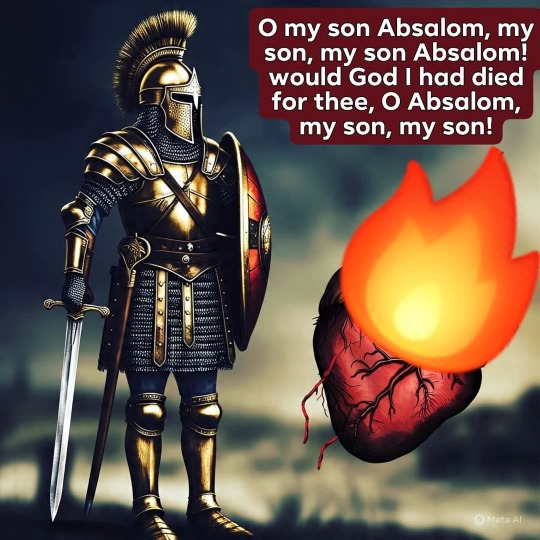
Part 1: Sacrifice, Victory, and the Torn Heart of a King (2 Samuel 17-18)
I. Introduction
Brothers and sisters, let's turn our hearts and minds to the poignant narrative found in 2 Samuel chapters 17 and 18. Here, amidst the turmoil of rebellion and the clash of armies, we find profound lessons on sacrifice, the nature of true victory, and the agonizing tension between justice and love, particularly when confronted with the bitter fruits of vanity and rebellion.
II. Chapter 17
A. The Cost of Vanity and Rebellion (2 Samuel 17)
Chapter 17 paints a stark picture of the consequences of Absalom's vanity and rebellion. Driven by a desire for power and fueled by Ahithophel's seemingly brilliant, yet ultimately destructive, counsel, Absalom rejects the wisdom and authority of his own father, the anointed King David.
B. Ahithophel's "Sacrifice" of Loyalty
Notice how Ahithophel, once David's trusted advisor, sacrifices his loyalty and integrity at the altar of political expediency. His counsel, though strategically sound in a worldly sense, is devoid of righteousness and rooted in betrayal. This reminds us that not all sacrifices are pleasing to God. Some are offered on the unholy ground of self-interest and malice.
C. Hushai's Sacrifice of Comfort for Loyalty
In stark contrast, Hushai chooses a different path of sacrifice. He risks his own safety and comfort to remain loyal to David. His seemingly foolish counsel, divinely inspired, sacrifices immediate strategic advantage for the sake of his king and ultimately, for God's will to prevail. This illustrates that true sacrifice often involves personal cost and may not always appear logical in the moment.
D. The Delay as a Divine Opportunity
The delay orchestrated by Hushai wasn't merely a tactical maneuver; it was a divine opportunity for David and his followers to regroup, to seek God's guidance, and to prepare not just for battle, but for the emotional and spiritual battle that lay ahead.
III. Chapter 18: The Battle and the Bitter Victory (2 Samuel 18)
Chapter 18 brings us to the inevitable clash. The battle in the Wood of Ephraim becomes a stage for both military victory and profound personal loss.
A. David's Torn Heart: The Sacrifice of a Father's Will
Consider the heart of King David. As he sends his army into battle, he issues a desperate plea: "Deal gently for my sake with the young man Absalom" (2 Samuel 18:5). Here, we see a father torn between his duty as king and his love for his rebellious son. He is willing to sacrifice a swift and decisive victory if it means the safety of his child. This resonates with the ultimate sacrifice of our Heavenly Father, who allowed His own Son to suffer for the sake of a rebellious humanity.
B. Joab's "Sacrifice" of Obedience for Perceived Victory
Joab, however, makes a different kind of "sacrifice." He disregards David's explicit command and takes Absalom's life. In his eyes, this act secures victory and ends the rebellion. But was it a true victory? It came at the cost of obedience, compassion, and the deep grief of his king. This highlights the danger of pursuing victory at any cost, especially when it involves trampling on love and divine instruction.
C. The Consequences of Vanity and Rebellion
Absalom's end, caught in the branches, a symbol of his pride and his inability to humble himself, serves as a stark reminder of the destructive consequences of vanity and rebellion against God-ordained authority. His "glory" – his long hair – became his snare.
D. The Agony of Unconditional Love
David's reaction to the news of Absalom's death is heart-wrenching. His lament, "O my son Absalom, my son, my son Absalom! Would God I had died instead of thee, O Absalom, my son, my son!" (2 Samuel 18:33), reveals the depth of a father's unconditional love, even for a child who had wronged him grievously. This mirrors God's enduring love for us, even in our rebellion. He desires our repentance and restoration, not our destruction.
IV. Lessons for Our Lives
The story of Absalom's rebellion and its aftermath holds powerful lessons for us today:
A. Examine Our Sacrifices
Are the sacrifices we make rooted in love, obedience, and righteousness, or are they driven by selfish ambition and worldly gain?
B. True Victory Transcends Military Might
True victory in God's eyes is not always about earthly triumph but about faithfulness, obedience, and love, even in the face of adversity.
C. The Destructive Nature of Pride
Let us guard our hearts against the allure of vanity and pride, which can lead us down paths of rebellion and destruction.
D. The Power of Unconditional Love
Even when we are wronged, may we strive to reflect the unconditional love of our Heavenly Father, who desires reconciliation and restoration.
E. The Tension Between Justice and Mercy
Like David, we may often find ourselves torn between the demands of justice and the yearnings of our hearts for those we love, even when they have strayed. In these moments, let us seek God's wisdom to navigate this tension with grace and truth.
V. Conclusion
May this study of 2 Samuel 17 and 18 encourage us to examine our own hearts, to offer sacrifices that are pleasing to God, to pursue victories that honor Him, and to embrace the transformative power of His unconditional love, even for those who may seem undeserving.
Blessings,
Love & Light!
Shara Massey
https://www.reddit.com/r/ProProMinistries/s/EGdw5d2yJ1
#christian blog#christian faith#christian living#christianity#jesus christ#ministry#bible scripture#bible study#bible verse#spiritual journey#holy spirit#spiritual growth#spirituality
8 notes
·
View notes